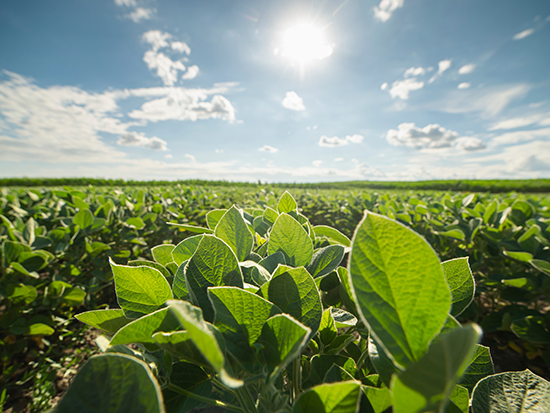 The NSF awarded $77.8 million to 14 projects, including the Interdisciplinary Program of Advancing Climate Extreme Resilience in Soybean, or iPACERS.The University of Alabama at Birmingham will take part in a new collaborative project aiming to develop sustainable agricultural solutions to combat climate change. UAB will oversee the establishment of a signature workforce seeking to educate the public on climate change to promote knowledge on ways to effectively mitigate food security issues in marginalized regions.
The NSF awarded $77.8 million to 14 projects, including the Interdisciplinary Program of Advancing Climate Extreme Resilience in Soybean, or iPACERS.The University of Alabama at Birmingham will take part in a new collaborative project aiming to develop sustainable agricultural solutions to combat climate change. UAB will oversee the establishment of a signature workforce seeking to educate the public on climate change to promote knowledge on ways to effectively mitigate food security issues in marginalized regions.
The Developing Diverse Researchers, or DDR, program will train nearly 40 K-12 teachers, 30 summer interns and 200 students in Summer Institutes, and indirectly reach over 6,000 K-12 students and thousands of family and community members annually.
This workforce will serve as a community outreach component under the Interdisciplinary Program of Advancing Climate Extreme Resilience in Soybean project.
iPACERS seeks to improve the production of soybeans through the improvement of resilience to drought and extreme heat. This project is one of 14 awarded under the National Science Foundation through the Established Program to Stimulate Competitive Research.
The iPACERS team will include researchers across UAB, Clemson University, Mississippi State University and Louisiana State University Agricultural Center. Led by former UAB professor Shahid Mukhtar, Ph.D., the iPACERS team at Clemson will research into the molecular impacts of two varieties of soybeans. The other universities will explore impact of the heat and drought environmental stressors via the weather and soil composition the soybeans must grow in.
Michael Wyss, Ph.D., director of the UAB Center for Community Outreach Development, who will lead the DDR at UAB, says the outstanding science developed in iPACERS will illuminate the interface between soy, genes and weather conditions and will be translated into a series of educational opportunities for middle and high school students, as well as college students. Wyss believes the iPACERS’ research and educational opportunities will equip teachers, researchers, farmers, agricultural agents and others with the knowledge to understand emerging climate challenges and methods by which biology can successfully address them.
“These iPACERS science education programs will initially be developed and tested at UAB in collaboration with scientists at the other three sites and then shared as cost-effective educational tools that will engage diverse learners of all ages, anywhere in the world, and make all of them realize they can be part of future success,” Wyss said.
Muhktar will serve as an adjunct at UAB, assisting with the development of the DDR program.
“I’m excited to lead an interdisciplinary team across four states in designing a sustainable and climate-smart soybean program to tackle heat and drought,” Muhktar said. “We’re combining advanced research from single-cell omics to field-based phenomics, utilizing approaches from molecular biology to artificial intelligence, and applying precision farming with beneficial microbes.”
Muhktar says this framework can be adapted to address climate challenges for other crops.